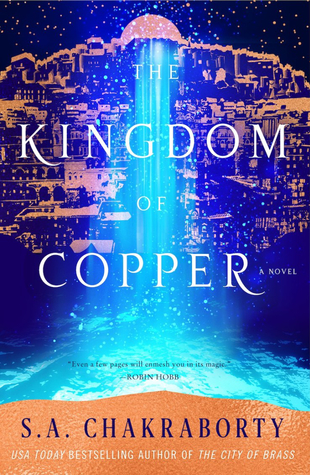
Nous sommes heureuses d’accueillir S.A. Chakraborty, l’auteure de la série The Daevabad Trilogy. Merci à elle pour les réponses !
We are very happy to welcome S.A. Chakraborty, the author of the Deavabad Trilogy. Thanks to her for the answers!
 Welcome on Between Dreams and Reality, can you introduce yourself in a few words?
Welcome on Between Dreams and Reality, can you introduce yourself in a few words?
Certainly! My name is S.A. Chakraborty, and I’m a speculative fiction writer and history buff from New York City.
For those who don’t know about it can you tell us a bit more about the Daevabad series?
The Daevabad Trilogy is a historical, epic fantasy about a con artist from 18th century Cairo who gets pulled into a brewing magical war when one of her schemes accidentally summons a mysterious djinn warrior.
City of the Brass is your first novel, was it difficult to write? How long did it take?
It probably took several years though it’s difficult to pinpoint because it started as a world-building project that I really just did as a hobby. There were times when the writing was difficult of course, especially during revisions, but it really began as a labor of love and the world was enjoyable to slip into after a long day of work and parenting!
What is your writing process?
I’m not sure I necessarily have a process! I wrote a lot of this book while I was pregnant and then parenting a baby and toddler, so I suppose my only rule was to be flexible. Unfortunately, I’ve never been able to outline well; much of the story comes to me as I write so I really just try to get it all on the page—no matter how terrible the actual prose—and then edit from there and see where I’m going. I do find a good cup of tea, some incense, and some music (I like a lot of movie soundtracks) helps set the mood.
You chose to set a part of your story in Cairo, is it a city you know well?
Haha, I might know its past better than its present. I did a lot of research for the book, but was actually most helpful in visualizing and writing 18th century Cairo was an historical architecture class I took while studying abroad at the American University of Cairo. I had a fantastic professor who would give lectures at the sites themselves and it really helped me put the scenes and political context together.
Why did you choose to write on djinns and demons? There aren’t a lot of books about Djinns and it was really interesting.
On the contrary, I think there are quite a few stories about djinn…we just don’t see much from their perspective. They tend to be the mysterious, silent side characters or one-dimensional monsters. But they’re fascinating! Semi-immortal creatures who live unseen among humans…imagine the history they would have witnessed! I wanted to really dig into the folklore and texts and imagine how they might have created their world; pulling from the human societies they’d watched rise and fall, along with their own magic.
How did you create the world? It’s always the thing the most complicated in fantasy.
The book actually began as a world-building experiment. I really wanted to go to graduate school to study medieval Islamic history, but when I had to take a break for a few years, I decided to create this sort of “historical fan-fiction” project. I set out to recreate some of places and stories I loved—the court politics of Abbasid Baghdad, the sailors’ yarns from the dhow culture of the Indian Ocean, the medical traditions of Mamluk Egypt—and of course add magic because I was a fantasy fan!
What can we expect for the sequel?
There’s little I can say without completely spoiling things, so I’ll just say both Nahri and Ali are wrestling to take control of the fates that have been handed to them…and that it takes them to a surprising place.
I was really surprised by the end. Did you plan it from the start or did it come as you were writing?
Oh, no, that was planned! I tend to let the story take me where it will, but that was an ending set in place from the very beginning.
Bienvenue sur Between Dreams and Reality, pouvez-vous vous présenter en quelques mots ?
Certainement ! Mon nom est S.A. Chakraborty, et je suis une écrivaine de fiction passionnée d’histoire et je vis à New York City.
Pour ceux qui ne la connaissent pas, pouvez-vous nous en dire plus sur la série Daevabad ?
La trilogie Daevabad est une fantasy épique et historique sur une arnaqueuse du 18éme siècle au Caire qui est entraînée dans une guerre magique quand l’un de ses plans invoque un mystérieux guerrier djinn.
City of the Brass est votre premier roman, était-ce difficile à écrire ? Combien de temps cela vous a-t-il pris ?
Cela m’a probablement pris quelques années bien que ce soit difficile à dire parce que il a tout d’abord commencé comme un projet que je faisais comme hobby. Il y a eu des moments où l’écriture était difficile bien sûr, surtout durant les révisions, mais c’est vraiment devenu un travail que j’aime et le monde était intéressant à retrouver après une longue journée de travail et de famille.
Quel est votre procédé pour écrire ?
Je ne suis pas sûre qu’il y ait vraiment un procédé ! J’ai écrit beaucoup du livre quand j’étais enceinte et quand je me suis occupée du bébé et d’un enfant en bas âge, alors je suppose que la seule règle est d’être flexible.
Malheureusement, je n’ai jamais été capable de tracer les grandes lignes à l’avance. La plus grosse partie de l’histoire m’est venue pendant que j’écrivais alors j’essayais d’en faire au maximum – même si la prose était terrible – et j’ai édité à partir de là pour voir où ça pouvait aller. Je trouve qu’une bonne tasse de thé, un peu d’encens, et un peu de musique (j’aime beaucoup les musiques de films) aident à se mettre dans le bain.
Vous avez choisi de placer une partie de votre histoire au Caire, est-ce une ville que vous connaissez bien ?
Haha, je dois mieux connaitre son passé que son présent. J’ai fait beaucoup de recherches pour le livre, mais ce qui a été le plus important à visualiser et à écrire le Caire au 18éme siècle, c’était le cours d’architecture historique que j’ai pris pendant que j’étudiais à l’American University of Cairo. J’ai eu un professeur fantastique qui donnait des conférences sur les sites eux-mêmes et ça m’a beaucoup aidée à assembler les scènes et le contexte politique.
Pourquoi avez-vous décidé d’écrire sur les djinns et les démons ? Il n’y a pas beaucoup de romans sur les djinns et c’était vraiment très intéressant.
Au contraire, je pense qu’il y a beaucoup d’histoires sur les djinns… Nous n’avons juste pas grand-chose de leur perspective. Ils ont l’habitude d’être des personnages mystérieux et silencieux ou des monstres d’une dimension. Mais ils sont fascinants ! Des créatures semi mortelles qui vivent cachées au milieu des humains… Imaginez l’histoire qu’ils doivent avoir vue ! Je voulais vraiment me plonger dans le folklore et les textes et imaginer comment ils avaient pu créer le monde, en prenant des sociétés humaines qu’ils avaient vues grandir et succomber, avec leur propre magie.
Comment avez-vous créé le monde ? C’est toujours le plus difficile en fantasy.
Le livre a en fait commencé comme une expérience pour créer un monde. Je voulais vraiment finir l’école pour étudier l’histoire islamique médiévale, mais quand j’ai dû arrêter il y a quelques années, j’ai décidé de créer cette sorte de projet « fan fiction historique ». J’ai essayé de recréer quelques endroits et histoires que j’ai aimées/ aimés- la politique d’Abbasid Baghdad, les filets marins de la culture de l’Océan Indien, les traditions médicinales de l’Egypte Mamelouke – et bien sûr ajouter de la magie parce que je suis une fan de fantasy !
Que pouvons-nous attendre de la suite ?
Je ne peux pas en dire beaucoup sans spoiler l’histoire, alors je dirai juste que Nahri et Ali essaient de reprendre le contrôle de leur destin… et ça les amène dans un endroit très surprenant.
J’ai été très surprise par la fin. L’aviez-vous planifiée dès le début ou est-ce venu pendant que vous écriviez ?
Oh non, c’était planifié ! J’ai l’habitude de me laisser porter par l’histoire, mais c’était une fin définie depuis le début.
 Daevabad Trilogy, 1
Daevabad Trilogy, 1
Synopsis: Nahri has never believed in magic. Certainly, she has power; on the streets of 18th century Cairo, she’s a con woman of unsurpassed talent. But she knows better than anyone that the trade she uses to get by—palm readings, zars, healings—are all tricks, sleights of hand, learned skills; a means to the delightful end of swindling Ottoman nobles.
But when Nahri accidentally summons an equally sly, darkly mysterious djinn warrior to her side during one of her cons, she’s forced to accept that the magical world she thought only existed in childhood stories is real. For the warrior tells her a new tale: across hot, windswept sands teeming with creatures of fire, and rivers where the mythical marid sleep; past ruins of once-magnificent human metropolises, and mountains where the circling hawks are not what they seem, lies Daevabad, the legendary city of brass, a city to which Nahri is irrevocably bound.
In that city, behind gilded brass walls laced with enchantments, behind the six gates of the six djinn tribes, old resentments are simmering. And when Nahri decides to enter this world, she learns that true power is fierce and brutal. That magic cannot shield her from the dangerous web of court politics. That even the cleverest of schemes can have deadly consequences.
After all, there is a reason they say be careful what you wish for…


Mylene
les couv’ sont juste magnifiques :O
Gaëtane
Merci pour cette interview ;p
kindlemom1
Yay for authors that do their research, it really does show through the book I think. Great interview!
Sophia Rose
How fun! I was just talking about this book back in July with someone and we were both very curious about it. Neat hearing the author’s thoughts. Thanks, Melliane!
Mary Kirkland
I haven’t read any books about Djinn but I loved the Wishmaster movies about them.
blodeuedd
True, there are Djinns around, but not really from their pov
Heidi
There aren’t many books out there that feature Djinns. This one certainly caught my eye!
Mogsy @ BiblioSanctum
Great interview! I can’t wait for Kingdom of Copper.
Sarah R
Merci beaucoup pour cette interview !
Après lecture du résumé, je reste dubitative. J’aime les djins, la magis, l’univers islamique, mais je n’accroche pas vraiment à l’histoire… j’espère me tromper
Sarah R
Merci beaucoup pour cette interview !
Après lecture du résumé, je reste dubitative. J’aime les djins, la magis, l’univers islamique, mais je n’accroche pas vraiment à l’histoire… j’espère me tromper